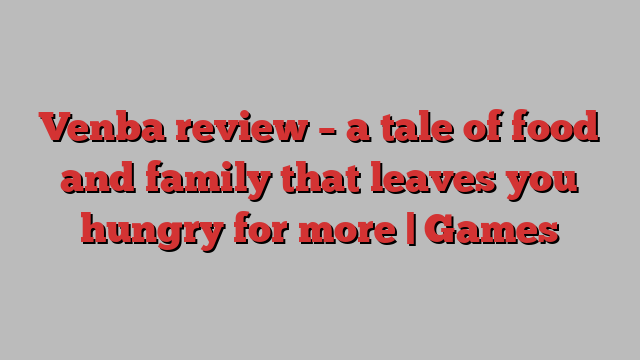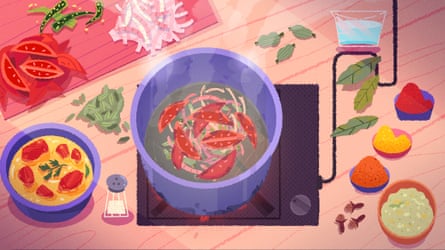
Venba and her husband are two Tamil immigrants who live in Canada, struggling with a new language, culture and a lack of job prospects – and hoping that their son Kavin may have an easier time than them. As Kavin grows up, Venba wants nothing more than to instil an appreciation for Tamil language and culture in him. But she doesn’t meet with much success.
Venba does most of her talking through food. Whether it’s announcing her pregnancy or teaching Kavin about his country of origin, everything leads back to the kitchen. As the player, you prepare a small number of dishes, all inspired by a battered recipe book brought along from India. Because the recipes have become hard to read in places, and many western players are unlikely to have seen some of the kitchen paraphernalia used to make Tamil dishes, making food isn’t so much about following a set of instructions as it is solving a puzzle.
These puzzles are very forgiving, avoid portraying anything about its own culture as exotic and other, and are likely to make you realise how approachable Tamil food is. If there’s one thing Venba is great at, it’s making you want to cook its recipes, thanks to its vibrant, appetising food art and great sound design. The music, which is vital to Venba’s cooking routine, is inspired by Tamil cinema and does a great job of making meal prep uplifting and fun. If you get stuck, hints are forthcoming, and there’s some interesting Tamil food trivia to learn.

The game is inspired by creative director Abhi’s real experiences as a second-generation immigrant – experiences that will feel highly familiar to anyone with a similar background. It’s a great example of much-needed representation in games and yet, Venba could have benefited from a longer playtime – at just over an hour to cover 30-odd years, it doesn’t take the time to cover more than the familiar feelings of homesickness and the difficulties of cultural assimilation. That doesn’t make the subjects any less important, but because the game assumes both Venba’s point of view and that of her son, it’s a little much for the short runtime.
Mechanically and narratively, Venba broadly succeeds, but you can’t help but wonder if it’s cut short by the limitations of its cooking puzzles; there’s only so much Venba might reasonably do in the kitchen. And the game is strangely avoidant on the subject of death, even though it plays a rather large role in the narrative. There’s a loss here we can only guess at, because we’ve barely seen Venba the wife or Venba the daughter, only Venba the mother. My own immigrant experience makes me wonder – is mentioning relatively little of their previous lives immigrant parents do to further shield their children from hurt, or is it a trace of their own upbringing, a generation taught not talk too much about themselves, a real-life phenomenon that influenced the way the game’s story could be told?
Mechanically and narratively, Venba broadly succeeds, but you can’t help but wonder if it’s cut short by the limitations of its cooking puzzles; there’s only so much Venba might reasonably do in the kitchen. And the game is strangely avoidant on the subject of death, even though it plays a rather large role in the narrative. There’s a loss here we can only guess at, because we’ve barely seen Venba the wife or Venba the daughter, only Venba the mother. My own immigrant experience makes me wonder: is mentioning relatively little of their previous lives something that immigrant parents do to shield their children from hurt, or is it a trace of their own upbringing, a generation taught not talk too much about themselves?
Similarly, we see Kavin first as something his parents are trying to control, then as someone taking his first tentative steps towards his cultural history – but it would have been nice to see him, and the food that’s so important to his story, as more than a source or expression of conflict, and to make his childhood years about more than rejecting Tamil food for a cheese pizza. Venba is a great example of stories we need to see more of. It would just have been nice to see more of this particular story, too.

